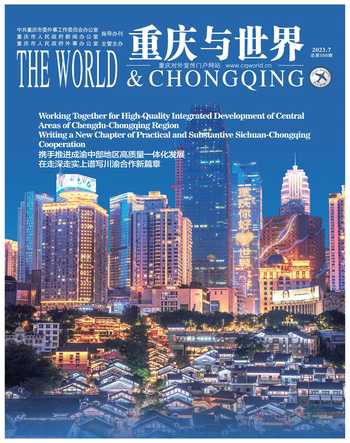Trade and Economic Multifunctional Platform for SCO Countries (SCO TEMP):Exploration of a Path to International Collaboration in the Digitalization of Industries Led by Chinese Companies
Liu Dingrui

Currently, global economic development calls for new models and driving engines. How can we foster a Chinese Model under the framework of digital business for Chinese companies in the context of global digitalization?
Wen Jixu, Secretary-General of the Trade and Economic Multifunctional Platform for SCO Countries (SCO TEMP), noted in a recent interview that in the era of digital intelligence, the digital transformation and innovative development of traditional industries require more than simple addition and adoption of digital technologies. It calls for comprehensive digitalization through a wide range of scenarios, from energy, raw materials, to production, and from product to delivery. This holistic approach aims to achieve comprehensive synergy and deep integration at different levels, including industrial systems, flow efficiency, dispatching effectiveness, and institutional efficiency. Therefore, successful industrial digitalization necessitates international collaboration and innovation among industries.
Industry Committee Pooling Together Outstanding Entrepreneurs to Form a “Digital Organization”
One important way to urge entrepreneurs to engage in international collaboration in industrial digitalization is to foster the integration of traditional non-governmental organizations (NGOs) with digital corporate communities. Mr. Wen noted that SCO TEMP leveraged the role of industry working committee to bring together excellent entrepreneurs in an effort to promote coordination in industry digitalization between China and SCO countries and foster a new ecosystem for SCO where digital technologies are fully applied in the real economy.
According to Mr. Wen, the industry working committee, initiated by industry leaders, was elected by no fewer than 35 upstream and downstream enterprises, including those from SCO countries and developed Western countries. The management body of the industry working committee, which is responsible for its day-to-day administration, was elected by the members assembly.
The members of the industry working committee also constitute a digital corporate community. They serve as data contributors and facilitate the building of an industry “digital organization” through integration of “digital increments” within the community. This is an important way to urge entrepreneurs to undertake collaborative innovation, and an attempt to foster international collaboration in the digitalization of industries led by Chinese companies.
Fostering International Collaboration in the Digitalization of Industries with Participation of Market Entities Under all Forms of Ownership
Currently, China has the most advanced industrial manufacturing system in the world. Its vast market and mature industrial sector play a vital role in advancing production capacity and promoting efficient mass production in the international collaboration on industry digitalization. Mr. Wen believes that Chinese enterprises should take the initiative to lead the exploration of a new ecosystem for international collaborative innovation in the digitalization of industries. By consolidating market entities under all forms of ownership through conventional NGOs and digital corporate communities, we aim to establish an integrated digital ecosystem of industrial chains, and create a new model of integrated development, with centrally-managed enterprises as initiators, local state-owned enterprises as mainstays, private enterprises as pioneers, and foreign-invested enterprises as partners.
Mr. Wen said, upstream and downstream enterprises constitute a relatively complete industrial chain cluster, in which they systematically devise a holistic model of business digitalization for specific projects. In the process of the digitalization of industries, centrally-managed and local state-owned enterprises, private enterprises, and foreign-invested enterprises should take due responsibility and conceive top-level plans, such as entry and exit mechanisms for capital under all forms of ownership, and digital collaborative innovation among various market entities. They should also promote division between capital management and asset management, research and commercialization, production and trade, domestic and overseas reserves of resources, and different industrial factors. By building “digital organizations” of the industry, the goal is to achieve data assetization of the projects and asset securitization, thereby enabling capital under all forms of ownership to achieve win-win outcomes, fostering a new ecosystem for international collaboration in the digital industry.
Digital Reconstruction of Business Model Led by Chinese Manufacturing
“Chinese manufacturing as competitive resources for export will bring closer sci-tech innovation companies worldwide, to share long-term benefits in industrial digitalization”, said Mr. Wen. He suggested that resource-based enterprises from SCO and the Belt and Road countries be integrated into the system of industry digitalization. This integration, along with unique reserves of resources of China, SCO, and Belt and Road countries, can be leveraged to attract investments from other countries.
Mr. Wen noted that during the process of exploration, based on “digital organizations” established by entrepreneurs and industrialists, projects can be organized with data as the link by re-examining the digital potential of the industry chain, redesigning the ecological layout, utilizing digital instruments and technologies to digitalize business models and industrial chains, and integrating the “digital increment” of enterprises within the industrial chain. This approach involves investing in, constructing, operating, and collaborating on projects to generate “data assets”. These data assets will contribute to promoting digital interconnection between industries, thus establishing a global industrial Internet platform and data asset platform. On this basis, digital organizations in various industries engage in international cooperation in digital finance and equity to achieve securitization of digital finance and digital asset. With all those efforts, a new global digital business model will take shape, in which Chinese manufacturing takes the lead, and countries with different resources actively join in digital equity cooperation on technology, R&D, manufacturing, and resources featuring barter-to-digital settlement.
Photo/SCO TEMP

